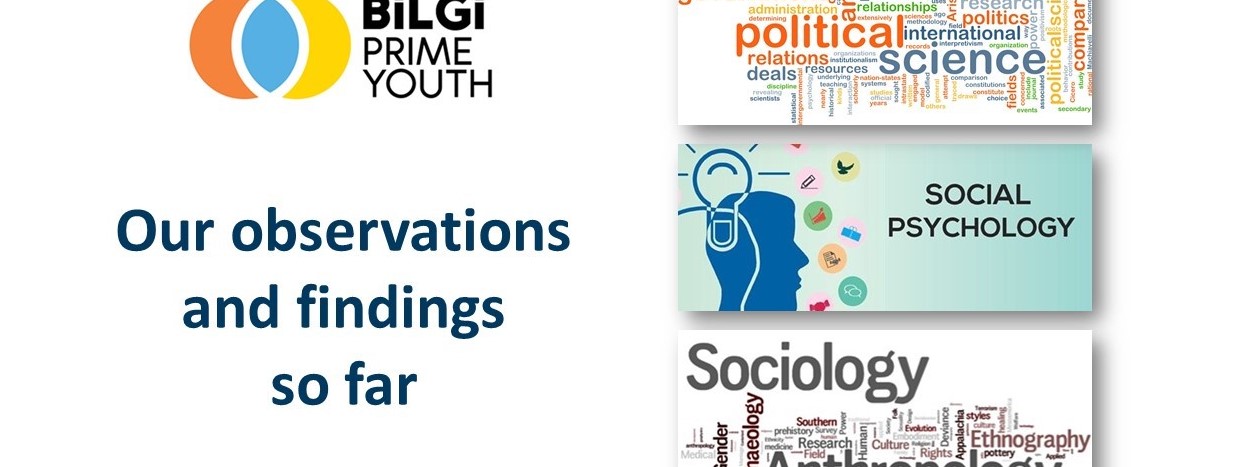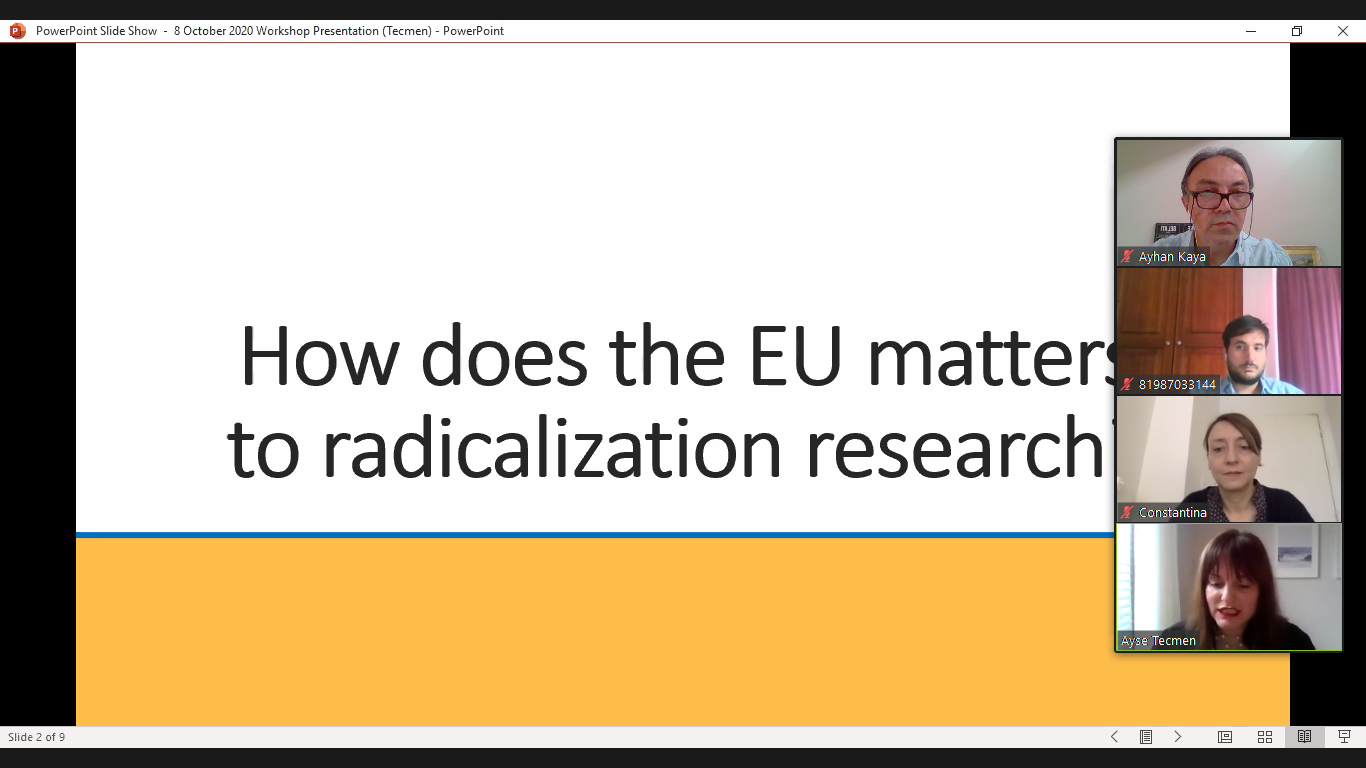
Workshop On Radicalization And Political Extremism on 8 October 2020
We are happy to announce that we have completed our PRIME Youth Workshop titled “Radicalization and Political Extremism” on 8 October 2020. We share our initial findings from the ERC-funded PRIME Youth project along with presentations from esteemed colleagues on the current debates surrounding radicalisation.
This conference was moderated by Prof. Constantina Badea of Universite Paris Nanterre.
After Prof. Badea’s welcome speech, project’s PI Prof. Ayhan Kaya (İstanbul Bilgi University, European Institute) made a presentation on “Nativism, Islamophobism and Islamism in the Age of Populism: Culturalization and Religionization of What is Social, Economic and Political in Europe”. Kaya scrutinized social, economic, political and psychological sources of the processes of radicalization among native European youth and Muslim-origin youth with migration background, who are both inclined to express their discontent through ethnicity, culture, religion, heritage, homogeneity, authenticity, past, gender and patriarchy. In order to explain the relationship between Islamophobism and Islamism emerging in both national and transnational spaces, Kaya also shared the main initial findings from the field research in Germany, France, Belgium and the Netherlands. These initial findings focused on the rise of the civilizationist discourse, the discontents accompanying socio-economic deprivation as well as the terminological confusions surrounding radicalisation.
In the second presentation of the first session, Dr. Ayse Tecmen (İstanbul Bilgi University, European Institute) discussed “European Union’s Articulation of Radicalisation: Deconstructing the Discursive Formulation of Radicalism through Counter Measures”. She discussed radicalization and its prevention as a key pillar of EU’s counter-terrorism strategy. Tracing the methods of cooperation and the proliferation of prevention strategies, she analysed the EU's radicalization discourse through a discourse-historical analysis focusing on the interplay between EU strategies and social, and cultural developments. This illustrated that the EU mainly reacts to the internal and external dynamics influencing the political and public debates. Tecmen noted that In the EU's discourse escalation of radicalization to terrorism remains the central premise but in the mid-2010a “root causes” of radicalisation were introduced to partly address individual socioeconomic and psychological factors provoking radicalization.
In the third presentation of the first session, In her presentation titled “Using Values To Guide Analysis: Initial Observations From Our Research Data”, Dr. Aysenur Benevento (İstanbul Bilgi University, European Institute) argued that narrating is purposeful; and that we use it to present ourselves in ways that connect or disconnect with the social and political milieu or to suggest different views of how things should be. Emphasizing the should aspect, she explained why values analysis (Daiute, 2014) was selected to analyze the interview transcripts. Benevento asserted that values analysis is grounded on the idea that values guide individuals’ narratives. People interpret, adopt, modify existing values of their cultures in order to be part of or differentiate themselves from other cultures. There is also a broader process for comparing the value enactments across narratives. In the context of the PRIME Youth project, the narratives represented and organized via the four countries and the native/Muslim status will allow the research team to analyze and compare similarities and differences across groups of people.
The second session of the workshop focused on presentations from colleagues in the social-psychology discipline who provided us with insight into various studies on radicalisation.
In the first presentation of the second session, Professor David Bourguignon (Université de Lorraine Metz) presented “From Islamophobia to Communitarianism: The dynamic between French and Muslim identities” on behalf of his co-authors Nada Negraoui (Université de Lorraine Metz) and Layla Azzouzi (Université Catholic of Louvain, Louvain-La-Neuve). He argued that in France, 4 million people are of Arab origin and are Muslim. Although they are French, they face prejudice and discrimination in daily life. Bourguignon asserted that according the Rejection-Identification Model, in the face of discrimination, stigmatized people respond by increasing their identification with their group in order to protect their well-being (Branscombe, Schmitt and Harvey, 1999). Although protective, this strategy is accompanied by hostility towards members of dominant groups. Bourguignon stated that across two studies, they tested the Rejection-Identification Model on a sample of French and Belgian Muslims. Results show that Muslim identification serves as a buffer to cope to Islamophobia and to protect their well-being. Furthermore, no links appear between perceived discrimination and French/Belgian identification and between French/Belgian identification and Muslim Identification. Bourguignon noted that Muslim identification mediated the relationship between perceived discrimination and French/Belgian hostility. Results shed new light on the phenomenon of communitarianism and will be discussed in light of the stigma literature.
Assistant Professor Jocelyn J. Bélanger’s (New York University Abu Dhabi) presentation “Ideological Obsession: Sociocognitive Processes and Policy Implications” posited that violent extremism is driven by “ideological obsession” –an ideological commitment fueled by unmet psychological needs and regulated by inhibitory and ego-defensive mechanisms. Drawing from cross-cultural evidence, Bélanger described four processes through which ideological obsession puts individuals on a path toward violence. First, ideological obsession deactivates moral self-regulatory processes, allowing unethical behaviours to be carried out without self-recrimination. Second, ideologically obsessed individuals are easily threatened by information that criticises their ideology, which in turn leads to hatred and violent retaliation. Third, ideological obsession changes people’s social interactions by making them gravitate toward like-minded individuals who support ideological-violence. Finally, ideologically obsessed individuals are prone to psychological reactance, making them immune to messages intended to dissuade them from using violence. Bélanger noted that in fact, messages espousing nonviolence have the opposite effect by reinforcing their violence-supporting ideology. He concluded by presenting strategies to prevent radicalisation for individuals in pre-criminal spaces.
In the third presentation of the second session, Dr. Jais Adam-Troian (American University of Sharjah, UAE) made a presentation titled “Using First-Person Plural Pronouns from Search Volume Data to Predict Political Behavior” on behalf of his co-authors Dr. Thomas Arciszewski (Aix Marseille University, Centre PsyClé) and Dr. Eric Bonetto (Aix Marseille University, LPS - Centre PsyClé – INCIAM). He argued that the main factor mobilizing individuals into violent and nonviolent political action remains the extent to which they feel identified with a protesting group (i.e., social identification). Adam-Troian noted that social identification is a key driver of both activism and radicalism and although the link between social identification and political behavior is well-established, current evidence relies mostly on self-report data. To tackle this issue, Adam-Troian et. al. combined real-life protest counts in the US (2017-2020) with online search data (Google Trends) for pronouns indicating a 'group' mindset (first-person plural pronouns; e.g. 'we', 'us'). Time series analyses indicated that weekly fluctuations in searches (N = 164) predict both protest and protester counts over time. Confirmatory mixed-models then showed that a 1% increase in pronoun searches was linked with +13.67% protests and +47.45% protesters the following week. Adam-Troian also argued that these original results have important implications for the ecological study and quantification of political behavioral dynamics in psychology. He noted that future research should aim to replicate and extend these findings to violent political behavior as well as participation in terrorist organizations.
























